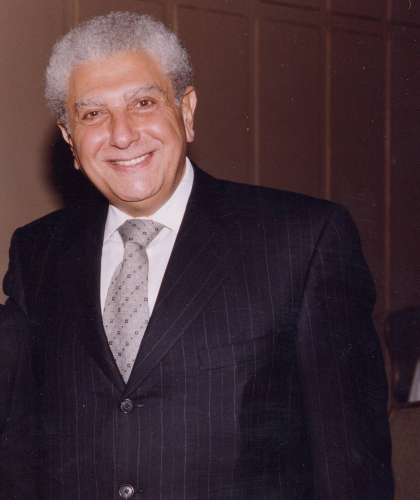Apr 04, 2011
DePaul Law Professor Chosen to Head UN Commission Investigating Human Rights Violations in Libya
DePaul Law Professor Chosen to Head UN Commission Investigating Human Rights Violations in Libya
M. Cherif Bassiouni, professor emeritus at DePaul University’s College of Law, has been named by the U.N. Human Rights Council to serve as chair of a special commission to investigate abuse allegations arising from the fighting between rebels and forces loyal to Libyan leader Col. Muammar Gadhafi.
Bassiouni said the commission is scheduled to issue a preliminary report on its findings to the Human Rights Council in June. With an air of exasperation, Bassiouni, a leading U.N. war crimes expert and scholar, noted that the Libya conflict is the fourth war he has investigated. The others were in the former Yugoslavia, Afghanistan and Iraq.
Although he said he doesn’t necessarily feel honored to head the commission, Bassiouni noted that “I have dedicated my life to international criminal justice. So it is rewarding to know that I still have the confidence of the U.N.’s Human Rights Council to lead the investigation.”
He said the commission is forming a 15- to 20-person team to investigate reports of human rights law violations and determine the facts and circumstances surrounding them. The commission, for example, will speak to a variety of people involved in the conflict, including people in refugee camps and some of those hospitalized after being injured in the conflict.
Based on his experience, Bassiouni anticipates that the commission’s work will be complicated and will encounter a number of logistical roadblocks. “For example, you may investigate reports of a civilian building being destroyed by government forces, but it could turn out that the building was a valid military target because the civilians were actually working for rebel forces. That’s why these investigations are very difficult and require a great deal of expertise.”
Bassiouni is author of the recently released book titled “The Institutionalization of Torture by the Bush Administration: Is Anyone Responsible?” It outlines how the U.S. engaged in a seven-year program of torture involving an estimated 200,000 people and resulting in more than 100 deaths, under the guise of George W. Bush administration’s war on terrorism.
Bassiouni, a native of Egypt, founded the International Human Rights Law Institute (IHRLI) in DePaul’s College of Law in 1990. Since its creation, the IHRLI has been at the forefront of contemporary human rights research, training and advocacy. President of the International Institute of Higher Studies in Criminal Sciences in Syracuse, Italy, and honorary president of the International Association of Penal Law in Paris, Bassiouni is known globally for his extensive work in international human rights law and human rights advocacy.
He was co-chair of the Committee of Experts that prepared the first draft of the 1984 Convention Against Torture (1977-1978); and member, then chairman, of the Security Council’s Commission to Investigate War Crimes in the former Yugoslavia (1992-1994). He was an independent expert for the Commission on Human Rights on The Rights to Restitution, Compensation and Rehabilitation for Victims of Grave Violations of Human Rights and Fundamental Freedoms (1998-2000), and the U.N.’s Independent Expert on Human Rights in Afghanistan between 2004 and 2006. In the former Yugoslavia and in Afghanistan, Bassiouni had firsthand experience in recording many cases of arbitrary arrest and detention of innocent persons, rape and torture.
The other leaders of the special commission on Libya are Asma Khader, a former Jordanian minister of culture and founder of a local human rights group, and Philippe Kirsch, a Canadian lawyer who served as the first president of the International Criminal Court (ICC).
About DePaul
With more than 25,000 students, DePaul University is the largest Catholic university in the United States and the largest private, non-profit university in the Midwest. The university offers approximately 275 graduate and undergraduate programs of study on two Chicago campuses, four suburban campuses and several international locations. Founded in 1898, DePaul remains committed to providing a quality education through personal attention to students from a wide range of backgrounds. For more information, visit www.depaul.edu

M. Cherif Bassiouni
